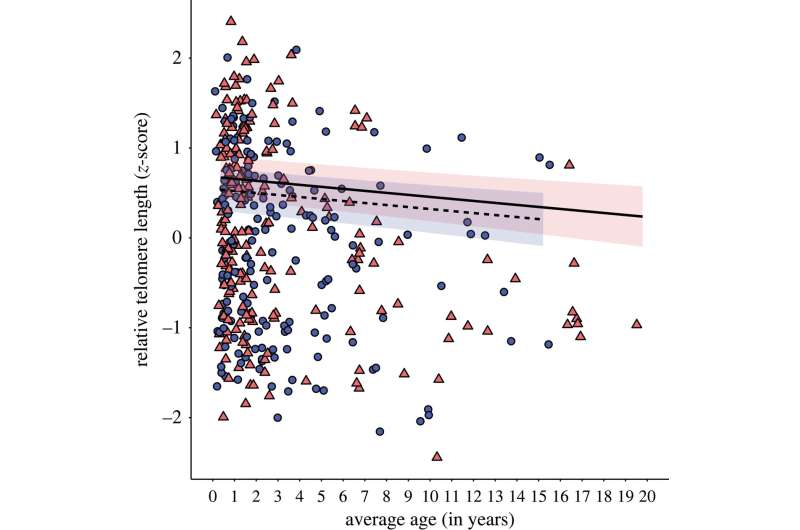This article has been reviewed according to Science X's editorial process and policies. Editors have highlighted the following attributes while ensuring the content's credibility:
fact-checked
peer-reviewed publication
trusted source
proofread
How climate change could cause havoc to the extraordinary lifespans of bats

The extraordinary lifespans of bats could be under threat from rising global temperatures, according to new research published in Proceedings of the Royal Society B: Biological Sciences.
The study
by researchers from University College Dublin and University of Bristol found that the hibernation cycle of a group of wild greater horseshoe bats affected by fluctuations in the weather had affected the
Telomeres are pieces of DNA that act as a protective structure at the end of chromosomes.
Each time a cell divides, they shorten. And it is this shortening that is associated with aging and aging-related diseases.
Data from the new study showed that bats who more frequently arose from hibernating due to warmer conditions during the 2019/2020 hibernation period had significantly shorter telomeres compared to those recorded in previous, colder, winters.
"We were surprised and then worried at this finding, given that the predicted rise in global temperatures could limit the beneficial effects of hibernation in our wild bats," said UCD Professor Emma Teeling.
The lead author of study Dr. Megan Power, from UCD School of Biology and Environmental Science, worked with a population of wild greater horseshoe bats (Rhinolophus ferrumequinum) in the U.K., which have been monitored since 1959 by Dr. Roger Ransome, who now holds the record for the longest mammal field study by an individual.
Carrying out the very first longitudinal study of telomeres in hibernating bats, she tracked more than 200 individuals across three winters to determine the beneficial effects of hibernation on telomeres.
Her work showed hibernation acts like a form of rejuvenation, where the telomeres extend rather than shortening during the hibernation season.
This is most likely due to the expression of the enzyme telomerase which allows telomeric DNA to replicate itself in bats without causing harm. In other mammals, including humans, the enzyme usually drives cancer when switched on in non-egg and sperm cells.
"It is fascinating that telomeres can extend in length, and it will be interesting to further investigate the potential role of telomerase in this process," said Professor Gareth Jones, University of Bristol.
Hibernation is different from sleeping, as the latter does not involve the same large drop in body temperature and metabolism.
Dr. Power said the study highlights the serious potential consequences that changing climatic conditions could have for the long-lived temperate of bats.
"We found that climate plays a huge role, showing how susceptible our native mammals can be to fluctuations in weather, with worrying implications given our forecasted climate changes. Species with long-life spans and a slow reproductive rate, like bats, are particularly vulnerable to environmental change. Therefore, it is important for us to understand how bats are affected by and cope with rapid climate change."
More information: Megan L. Power et al, Hibernation telomere dynamics in a shifting climate: insights from wild greater horseshoe bats, Proceedings of the Royal Society B: Biological Sciences (2023). DOI: 10.1098/rspb.2023.1589
Journal information: Proceedings of the Royal Society B
Provided by University College Dublin




















